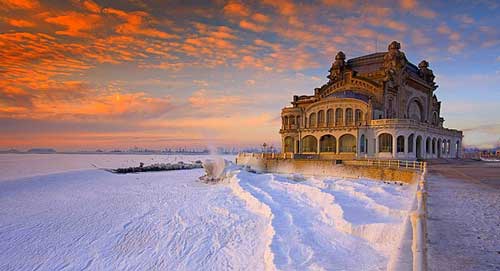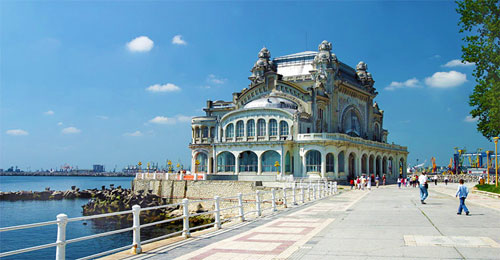The City of Constanta
Constanta is located in a region of Romania called Dobrogea (http://www.dobrogea.ro) which is the land between the Danube River to the west and Black Sea to the east. The history of the city goes back to 657 BC when it was the Greek controlled town of Tomis. When Romania became a Province of the Roman Empire in 106 AD the Romans later renamed the city after emperor Constantine who fortified and developed the city from 320 - 350 AD. The city was later destroyed in the 8th century by invading Slavs and Avars and then fell under Byzantine control. In 1418 the Turks had there turn at the region until the mid 1800s when the national state of Romania was created in 1862. Constanta was taken by Romania in 1877 after the Romanian War of Independence.
 Situated at the crossroads of several commercial routes, Constanta lies on the western coast of the Black Sea, 185 miles from the Bosphorus Strait. An ancient metropolis and Romania's largest sea port, Constanta traces its history some 2,500 years. Originally called Tomis, legend has it that Jason landed here with the Argonauts after finding the Golden Fleece.
Situated at the crossroads of several commercial routes, Constanta lies on the western coast of the Black Sea, 185 miles from the Bosphorus Strait. An ancient metropolis and Romania's largest sea port, Constanta traces its history some 2,500 years. Originally called Tomis, legend has it that Jason landed here with the Argonauts after finding the Golden Fleece.
Founded by Greek colonists from Miletos in the 6th century BC, Tomis was conquered by the Romans in 71 BC and renamed Constantiana by Roman Emperor Constantine the Great in honor of his sister. The name was shortened to Constanta during the Ottoman era. During the 13th century, Italy, especially Genoese merchants, dominated the Black Sea and Constanta flourished, only to decline two centuries later under Turkish rule.
Fine mansions and hotels were built in the 19th century when King Carol I decided to revive Constanta as a port and seaside resort.
Constanta is the fourth largest port in Europe, ranked right after Rotterdam, Antwerp and Marseille.
 The third largest city in Romania, Constanta is now an important cultural and economic centre, worth exploring for its archaeological treasures and the atmosphere of the old town centre. Its historical monuments, ancient ruins, grand Casino, museums and shops, and proximity to beach resorts make it the focal point of Black Sea coast tourism.
The third largest city in Romania, Constanta is now an important cultural and economic centre, worth exploring for its archaeological treasures and the atmosphere of the old town centre. Its historical monuments, ancient ruins, grand Casino, museums and shops, and proximity to beach resorts make it the focal point of Black Sea coast tourism.
Open-air restaurants, nightclubs and cabarets offer a wide variety of entertainment. While in the area, you can visit traditional villages, vineyards, ancient monuments and the Danube Delta, a bird-lover's paradise.
- Romania.org's dedicated website for Constanta:
http://www.constanta.ro & http://www.constanta.co.ro (in Romanian Language) - http://www.constanta.edu - Constanta's Academic and Educational Portal
- Hotels in Constanta
- Hotels in the resorts by the Black-Sea Cost near Constanta
